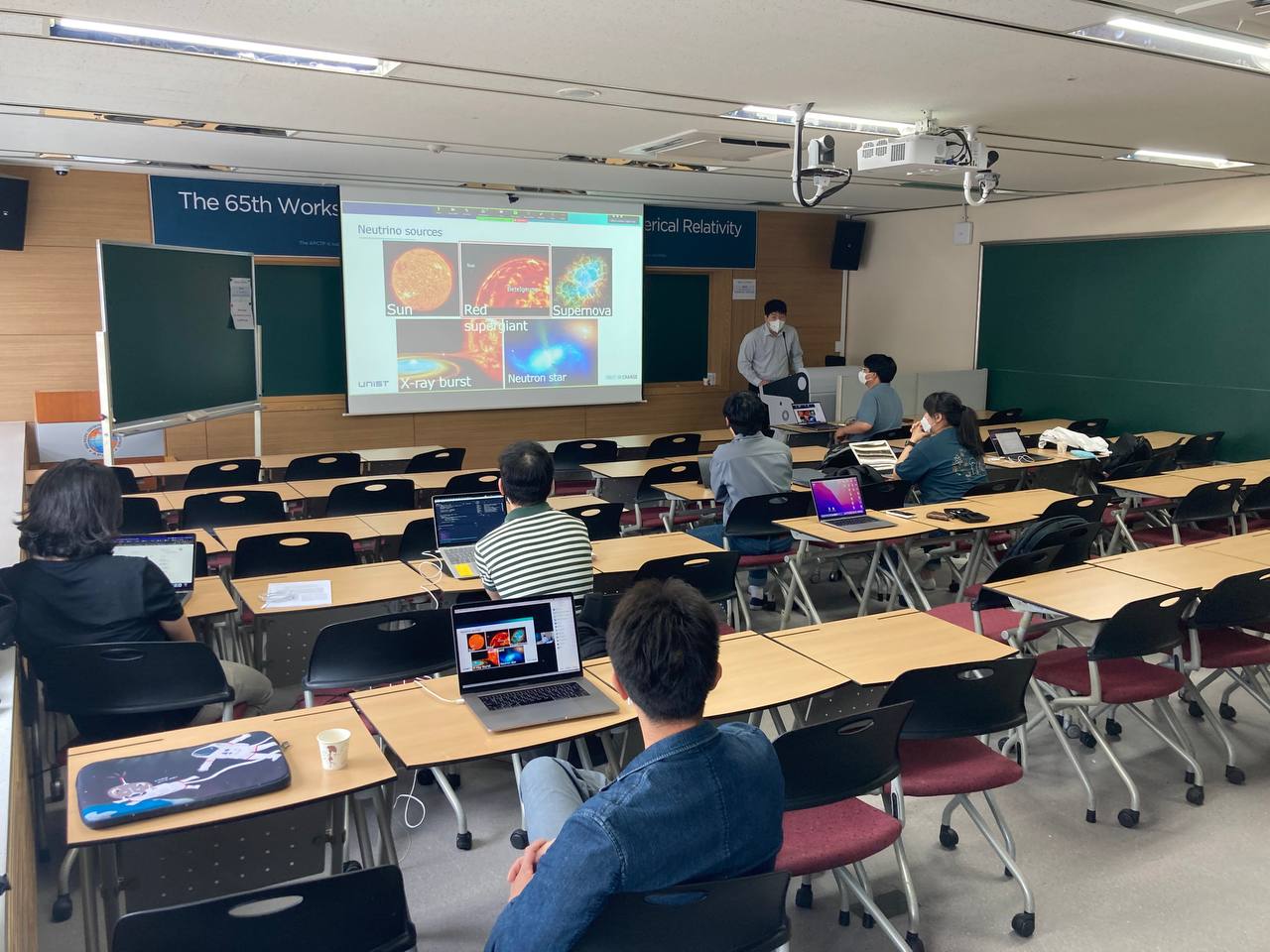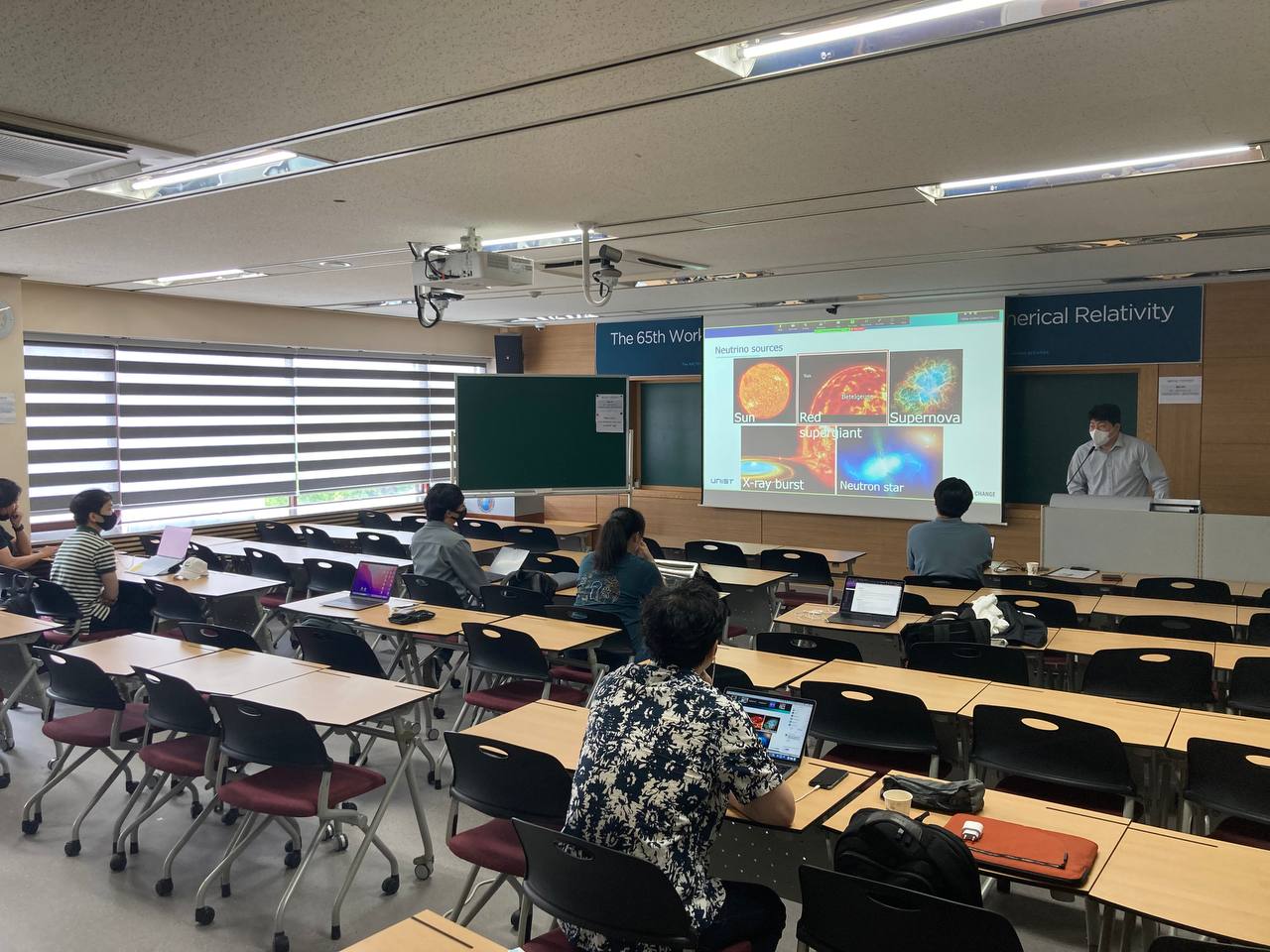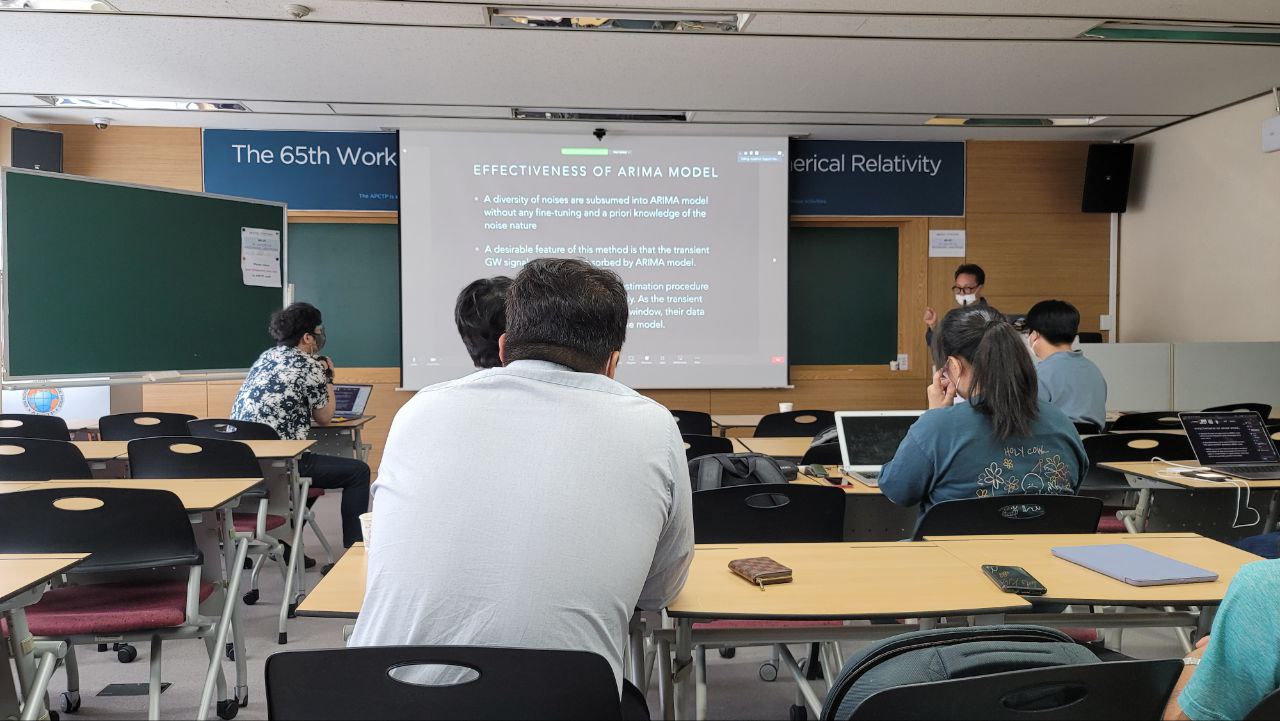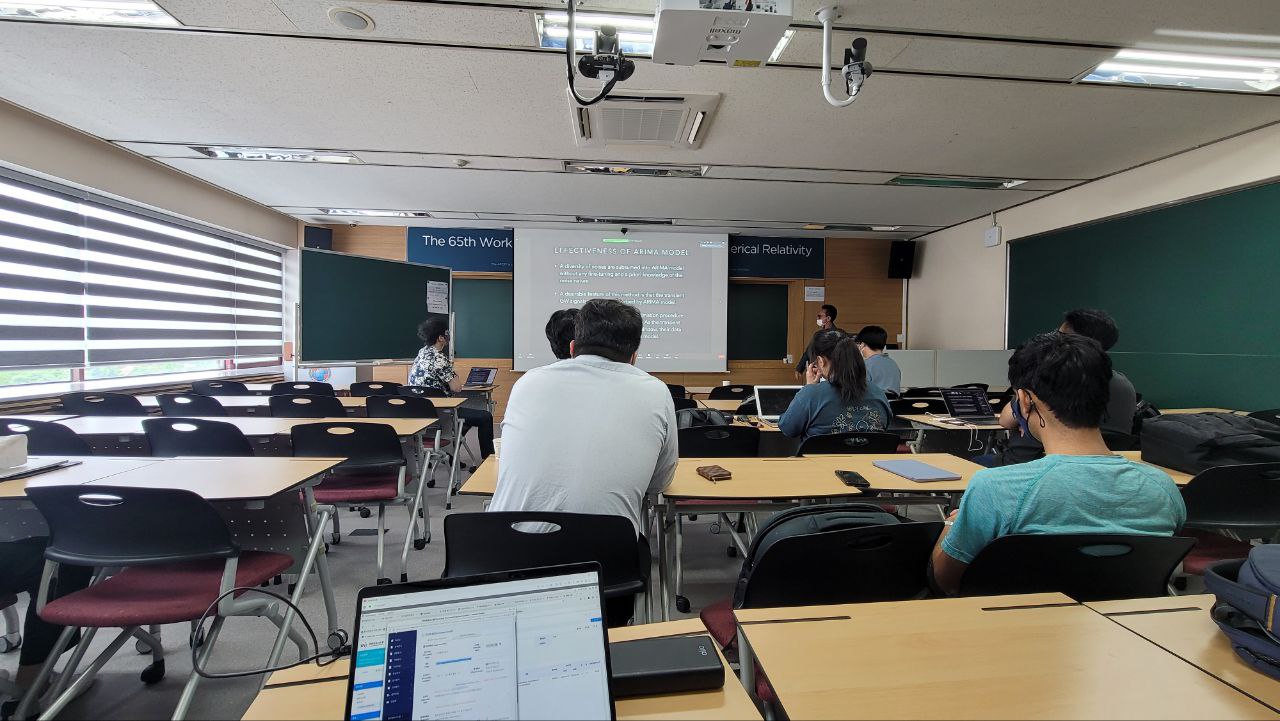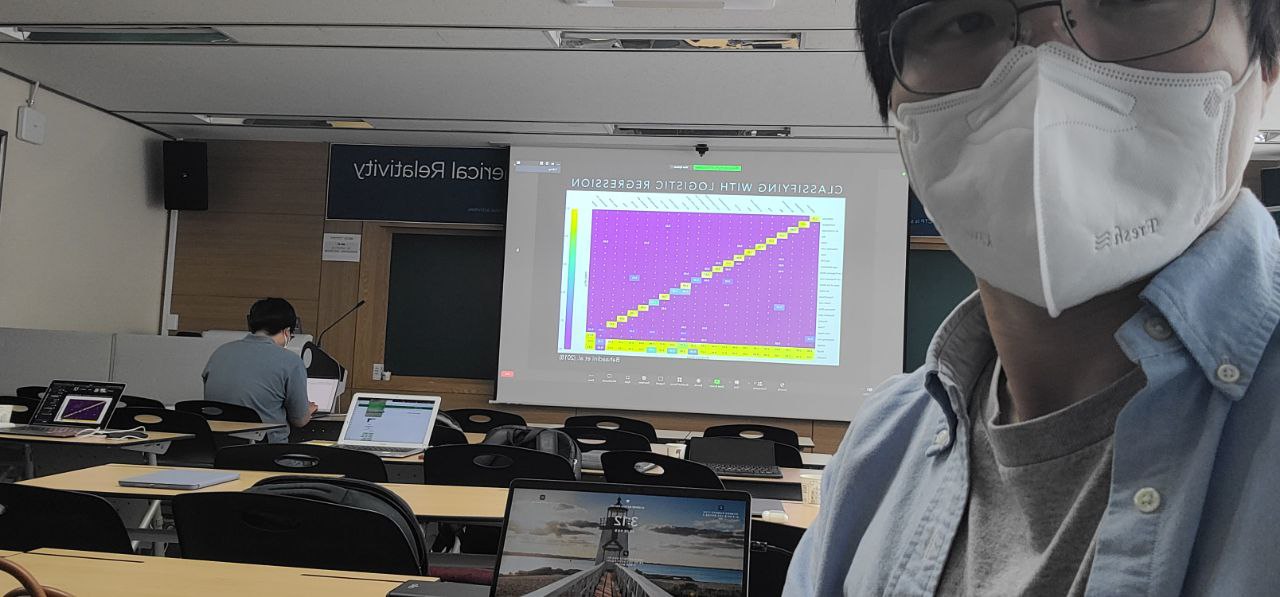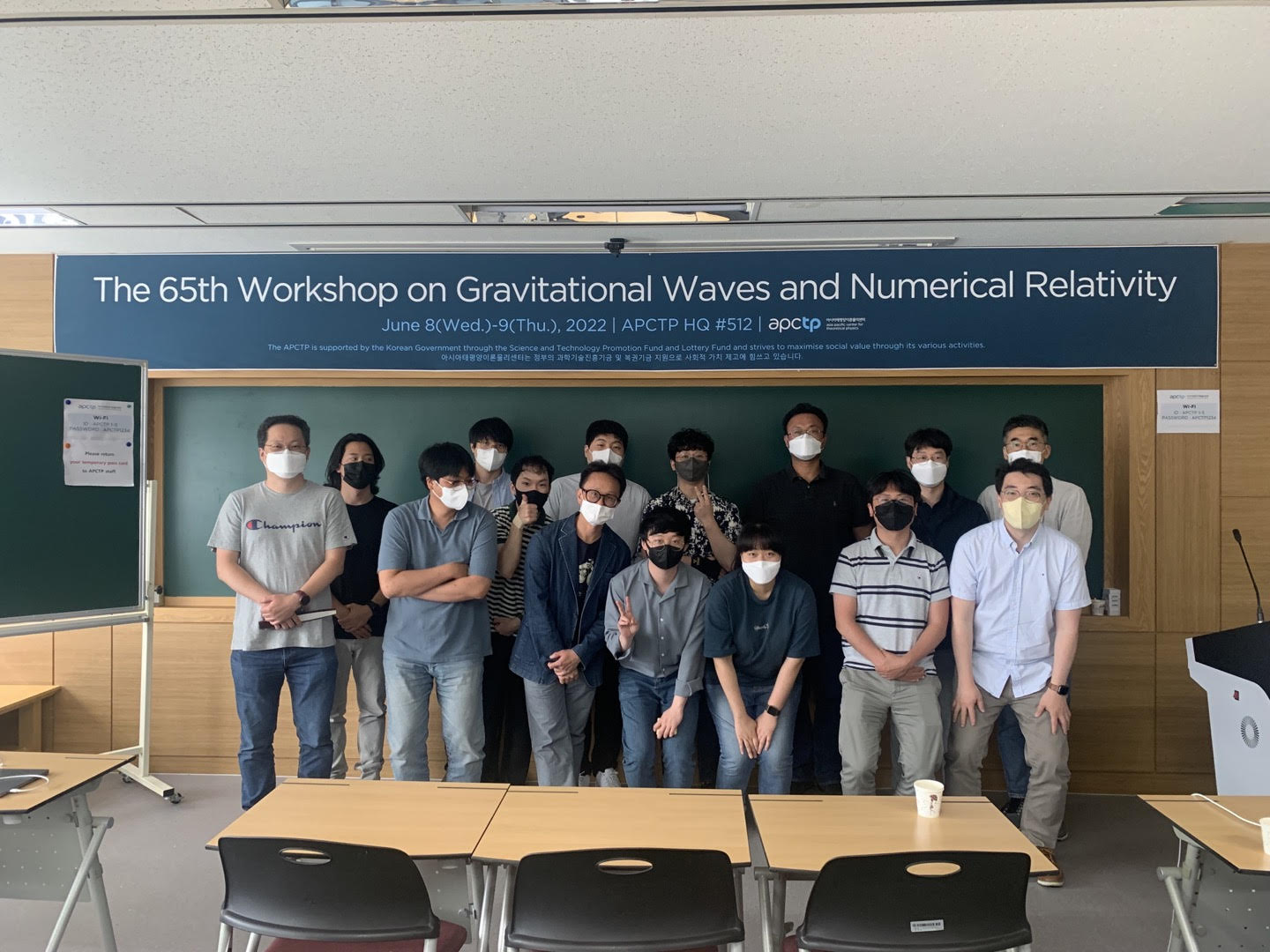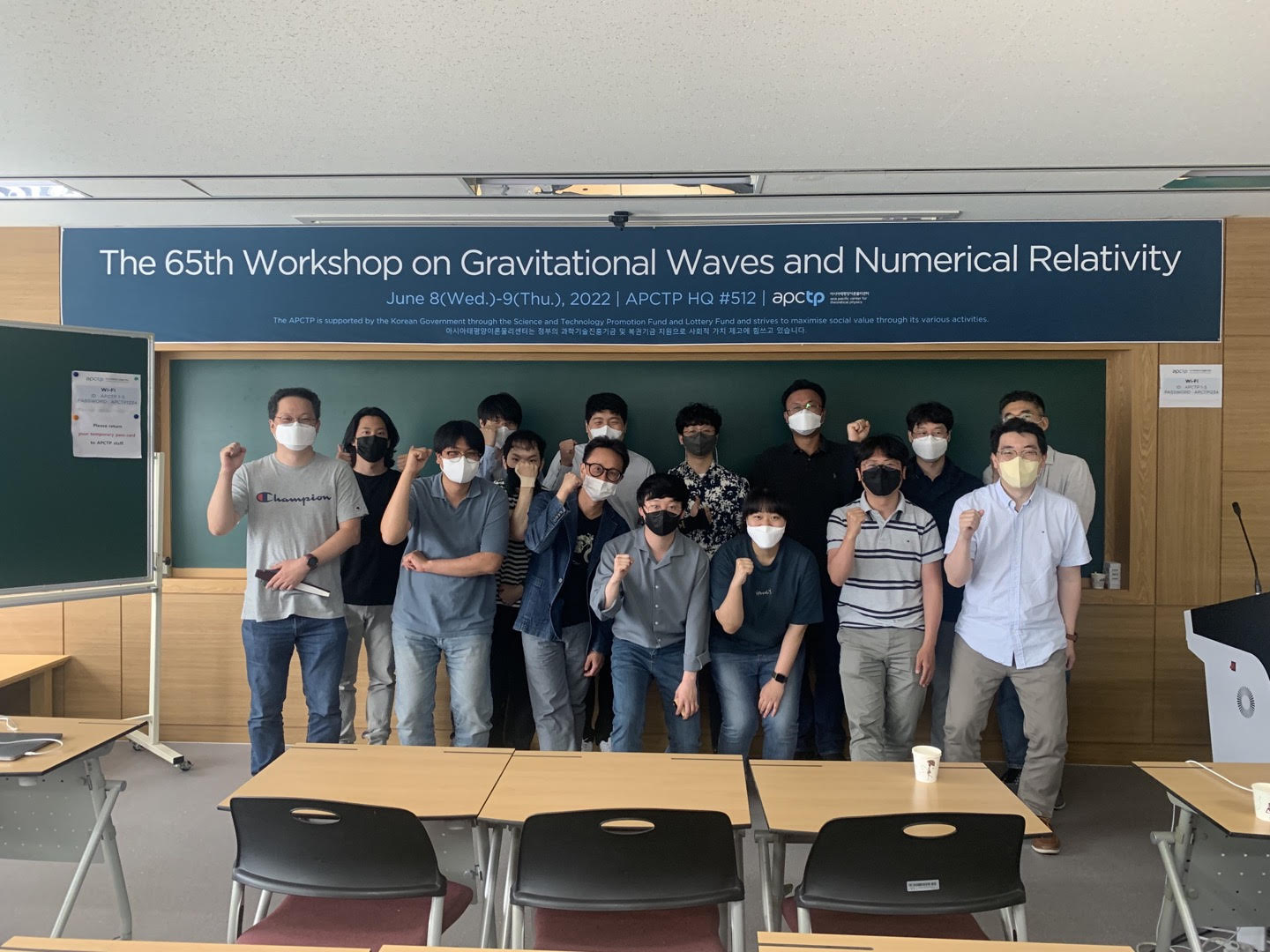Information
- Date: Jun. 8 (Wed.) - Jun. 9 (Thu.), 2022
- Venue: Rm #512, APCTP / Online (Hybrid)
- Audience: Researchers and students in astrophysics
- Number of participants: 15 Offline / 15 Online
- Format: Long and intensive sessions from basic lecture to the latest research with a comfortable atmosphere to ask questions and discuss freely
- Sponsor: APCTP
- Contact
- Chan Park: iamparkchan at gmail dot com
- Jinho Kim: jkim at kasi dot re dot kr
Program
- Time zone: Korea Standard Time (UTC+09:00)
- Jun. 8 (Wed.)
- 13:00 - 13:25 [Student Session 1] Modification of thermonuclear reaction in the astrophysical plasma (Eunseok Hwang / Soongsil University)
- 13:25 - 13:50 [Student Session 2] Neutrino emission from Red Super Giants (Gwangeon Seong / UNIST)
- 14:00 - 16:00 [Main Session 1] Searching gravitational wave signals with autoregressive approach and deep learning (David C.Y. Hui / CNU)
- 16:00 - 18:00 Discussion
- Jun. 9 (Thu.)
- 10:00 - 12:00 [Main Session 2] Gravitational-wave lensing (Otto Akseli Hannuksela / CUHK)
Sessions
- Modification of thermonuclear reaction in the astrophysical plasma
- Speaker: Eunseok Hwang (Soongsil University)
- Time: Jun. 8 (Wed.) 13:00 - 13:25
- Speaking Language: English
- Slide Language: English
- Abstract: In the astrophysical plasma, such as the early universe or inside stars, elements are created through the thermonuclear reactions. Therefore, we can understand the evolution of elements through the network calculation of nuclear reactions. However, because of the environmental features of plasma, nuclear reactions in these environments are different from what we understand in free space. Therefore, a more realistic nuclear reaction network can be reproduced by correcting the effect of plasma on nuclear reactions. In this work, we investigate the dynamical screening effect and the electromagnetic fluctuation as a correction of thermonuclear reactions. And apply these effects to the big bang nucleosynthesis(BBN) and solar core condition.
- Slide File: Hwang
- Neutrino emission from Red Super Giants
- Speaker: Gwangeon Seong (UNIST)
- Time: Jun. 8 (Wed.) 13:25 - 13:50
- Speaking Language: Korean
- Slide Language: English
- Abstract: In stellar astronomy, detecting neutrinos emitted from the stellar core can provide valuable information on the stellar structure, which electro-magnetic wave or light cannot provide, because neutrinos do not interact much with stellar matter due to their extremely small cross-sections with baryons. Despite this advantage, the progress in stellar neutrino astronomy is still limited to the Sun with current and/or near-future detectors simply because detecting neutrinos is quite challenging due to their extremely small cross-sections with baryons. In this work we searched for possibilities to observe astrophysical neutrinos other than the solar neutrinos, especially focusing on Red Super Giants (RSGs). We calculated neutrino luminosities along the stellar evolutionary tracks of massive stars as a function of mass and metallicity by using MESA, a publicly available stellar evolution code. We also calculated energy spectra of neutrinos emitted through various neutrino production processes. We find that a large number of neutrinos can be emitted via the pair annihilation process when RSGs are in the carbon-burning stage. However, it is still difficult to observe these neutrinos with current detectors because the energy of the neutrinos is too low to be detected.
- Searching gravitational wave signals with autoregressive approach and deep learning
- Speaker: David C.Y. Hui (CNU)
- Time: Jun. 8 (Wed.) 14:00 - 16:00
- Speaking Language: English
- Slide Language: English
- Abstract: We are experimenting novel approaches of searching gravitational wave signal by employing stochastic autoregressive modeling and deep learning. The Autoregressive Integrated Moving Average (ARIMA) model holds the potential for an automatic pipeline for noise reduction, event candidate detections and template-free parameter estimation. In our experiment with LIGO data, we have demonstrated our proposed noise-reduction scheme can result in enhanced performance in comparison with conventional method. We are also working on a deep learning algorithm by incorporating Generative Adversarial Network (GAN). By devising a GAN-based data augmentation scheme, we can tackle both small sample problem and imbalance class problem in classifying gravitational wave spectrograms with deep networks. By experimenting this framework with Gravity Spy dataset, we found that our method can improve the glitch classification comparable to or even exceed that achieved by transfer-learning. Furthermore, we found that the fluctuation in classifying classes with small sample are significantly reduced. With this, we can better separate the environmental/instrumental noise from the astrophysical signals. For further development, our framework holds the potential to be generalized for recognizing patterns from the gravitational wave signal with different physical origins.
- Slide File: Hui
- Gravitational-wave lensing
- Speaker: Otto Akseli Hannuksela (CUHK)
- Time: Jun. 9 (Thu.) 10:00 - 12:00
- Speaking Language: English
- Slide Language: English
- Abstract: Gravitational waves, like light, could be gravitationally lensed by intervening matter. Recent studies suggest that we will see gravitational-wave lensing within the coming years as the current ground-based detectors are upgraded. However, the methods to detect and employ gravitational-wave lensing are entirely different from light lensing. Indeed, we detect waves instead of particles, and the source population is one of merging black holes. For these reasons, the field might also pave the way to new applications. Here I will introduce the basics of gravitational-wave lensing and the recent progress in the field.
- Slide File: Hannuksela
Supports
- Accommodation
- 1 night 2 days (Jun.8 - Jun. 9)
- Location: PIC
- Meals
- Dinner on Jun. 8
- Breakfast on Jun. 9
Registration
- Link: Google Form
- Due
- Accommodation support or reservation is required: May 24 (Tue.)
- Online participation or no accommodation: Jun. 7 (Tue.)
Photos
